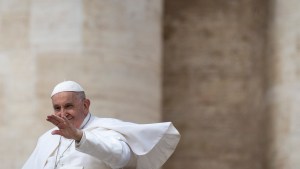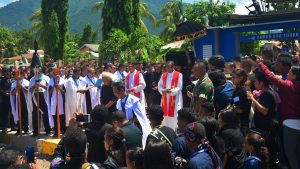Pope Francis has arrived in Indonesia, where from this September 3 to 6, 2024, Pope Francis will spend the first leg of his apostolic journey to Asia and Oceania. In the world’s most populous Muslim country, the question of interreligious dialogue will be one of the central themes of the trip. So also will the important place of the Indonesian Catholic community, which is certainly a minority, but particularly dynamic.
Fr. Kenny Ang, a doctoral student from Jakarta studying at a pontifical Roman university, bears witness to the growing enthusiasm generated by Pope Francis’ visit. He was able to return to his hometown for the vacations, and told Aleteia, “There’s a lot of joy here, and we’re making progress on the final details of preparations for the trip.” Jakarta is no longer the country’s capital, having been transferred to Nusantara on the island of Borneo this past August 17.
Like Fr. Kenny Ang’s family, more than 400,000 Catholics live in Jakarta. The city has 11 million inhabitants, 9.2 million of whom are Muslim (84% of the population). With 3.9% of its residents being Catholics, the city is relatively representative of the proportion of the country’s overall population (3%), i.e., 8.6 million believers.
Despite the Church’s minority status, the Indonesian Foreign Ministry described the Pope’s visit as important “not only for Catholics, but for all religious communities” in the country. Although many Indonesians “don’t know that the Pope is coming,” Fr. Kenny believes that members of other faiths who do know, particularly Muslims, “will welcome him with great joy.”

A multi-religious history
With the exception of a possible Nestorian presence in the archipelago in the 12th century, Islam preceded Christianity in Indonesia. In 1292, Marco Polo passed through the island of Sumatra, where he described a certain kingdom of “Ferlet.” This is the first historical evidence of the presence of Islam in the region: “Saracen merchants use this kingdom and its ships, and they have converted these people to the law of Mohammed.”
After the Venetian adventurer, there is Blessed Odoric of Pordenone. He was a Franciscan who was the first priest to sail along the Sunda (the name of the Indonesian archipelago) on a voyage in the early 14th century. And when the Portuguese arrived in the early 16th century, “Islam was already well established in Java and Sumatra,” explains Fr. Markus Solo, one of the few Indonesians working at the Vatican, at the Dicastery for Interreligious Dialogue.
Then, in the 17th century, the Dutch, who were predominantly Protestant, took over the archipelago. They pushed the Portuguese, and therefore the Catholic missions, to the east of the Sunda archipelago, where Protestant missions were also active. Today, it is in these regions that the largest concentrations of Catholics can be found. This is the case, for example, on the island of Flores, where Fr. Solo comes from, and where over 90% of the population is Catholic. “Geographically, Christianity is in the majority in a significant part of the archipelago,” he points out, as in the Moluccas and West Papua.
The land of Pancasila
With the country’s independence in 1945, the first president, Sukarno, imposed the Pancasila — the Five Principles. This was to be a national philosophy in order to unify an archipelago that was as diverse in religion as it was in culture and ethnicity. One of the five constitutional principles of Indonesian identity became monotheism, officially integrating Christians into the country’s identity.
“Indonesia has long been seen as a pioneer and model in the interfaith field,” explains Fr. Solo. From the outset, the Indonesian government has opposed Islamist movements head-on, and has maintained good relations with the Holy See. This was even the case during the crisis in East Timor, a predominantly Catholic ex-Portuguese colony that Indonesia annexed just a few days after its independence in 1975. The small country endured years of bloody warfare before Indonesia left its territory in 2002.
“We live in a society shaped by Islam,” says Father Kenny, who believes that an Indonesian Christian “would probably not be elected president.” But he insists that Christians do have a place in civil society, as evidenced by the regular appointment of Catholic ministers. Jakarta also had a Christian governor between 2014 and 2017. He also cites the example of a very famous Catholic actress in Indonesia, Sandra Dewi, a star with millions of followers on social networks, including Instagram and TikTok.

Fertile terrain for the “fraternity” championed by the Pope
This Indonesian model of religious tolerance and coexistence is in line with the idea of religious cooperation for peace promoted by Pope Francis. These ideas are particularly expressed in the Document on Human Fraternity, a text signed in Abu Dhabi in 2019 by Pope Francis and the Grand Imam of Al-Azhar, Sheikh Ahmed Al-Tayeb.
On August 21, Pope Francis signed at the Vatican a manifesto drafted by young Indonesians in which the principles of the Pancasila and the Abu Dhabi Document were outlined side by side.
It is in this spirit that Pope Francis will take part in an interfaith meeting at the vast Istiqlal mosque, the largest in Southeast Asia, in the presence of all the country’s religious authorities. The building is located just a few hundred meters from Jakarta’s cathedral, Our Lady of the Assumption. This proximity is not just geographical: A “tunnel of fraternity” was recently built, enabling visitors to go from one building to the other. Fr. Solo points out that the pontiff may well visit it.
A sometimes fragile situation
From the point of view of the Indonesian Catholic population, whose representatives the Pope will meet at Jakarta Cathedral and Stadium, the question of relations with Muslims is a “very important subject,” according to Fr. Solo. While they often get along well, the situation can also be very difficult on certain islands where stricter movements of Islam are better established.
In the Java region, marriages between Muslims and members of another religion are very rare and frowned upon. By contrast, they are very common and accepted between Catholics, Hindus, Protestants, and Buddhists. In some predominantly Catholic islands, such as Flores, sometimes it’s the Catholic side that blocks such unions.
In some regions, the harmony of the Pancasila is challenged by more conservative Muslim religious leaders, who do not hesitate to criticize the government. On the most recent national holiday, August 17, President Joko Widodo was accused by opponents of preventing Muslim women from taking on prestigious roles at official national holiday events because they were wearing the Islamic veil.
Despite the government’s precautions, the country has not been spared from violence. In 2018, three churches in Surabaya (Java) were attacked by a group close to the Islamic State. In 2021, a suicide bomber injured around 20 people at Makassar Cathedral, Sulawesi, during Palm Sunday Mass. The Indonesian authorities are on their guard: In the run-up to the Pope’s visit, two attacks were foiled by police on the island of Java.
A growing Church
Aware of these risks, Fr. Markus Solo is nevertheless confident about the safety of the pontiff and Catholics during the trip. The majority of Indonesians are very much in favor of the peaceful cohabitation of religions, and “the Church in Indonesia does not have a conversion strategy,” he explains. He assures us that although there are conversions to Catholicism on a regular basis, it’s “always without proselytizing.” Conversely, some Protestant movements are frowned upon in Indonesia for their overly aggressive attitude.
Fr. Kenny Ang describes his Church as aware of its minority status, but “very active and close to the people.” In Indonesia, he notes, lay people are “very involved” in parish life, sometimes even a little too involved. “There’s a tendency on the part of those who work for the Church to consider that those who aren’t as involved as bad Christians,” he explains. On the contrary, the young priest believes that the Church needs more Catholics involved in Indonesian society, in their work.
“And we’re not so small,” Father Kenny emphasizes, pointing out that there are more Catholics in Indonesia than in Ireland. The Indonesian Catholic community (8.6 million) is under-represented in the Curia, according to Fr. Solo, the only Indonesian working at the Vatican. This means that the local situation is not well understood in Rome. “The Catholic Church is old in Indonesia, but young in the way it’s progressing today,” he says.
Following the visit in Jakarta, via TV, and in neighboring East Timor
The situation differs greatly from province to province, particularly in the province of the Lesser Sunda Islands, the only predominantly Catholic province in the country, and home to a third of Indonesia’s Catholics (2.9 million). Unlike John Paul II in 1989, Pope Francis did not decide to visit this region, laments Father Markus Solo, originally from the island of Flores.
On the island of Java, where the Pope is visiting, Catholics number just under one million, or 10% of the country’s Catholics. “Most of them will be watching the Pope’s visit on television,” says Father Markus Solo, who will be accompanying the Pope on his trip, noting that small delegations from all over the country will be converging on Jakarta for Mass.
In the Flores region, some are planning to visit their neighbors in East Timor, which the Pope will visit a few days later.
“It’s difficult to show the Pope all the diversity and richness of our islands, with all their ethnic groups, religions, and cultures,” says Fr. Solo. “Dialogue is our daily bread in Indonesia,” he assures us.



